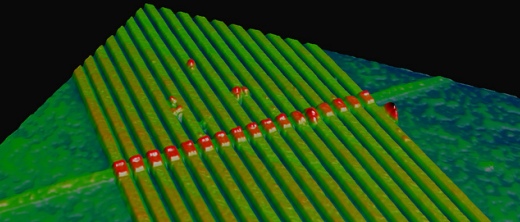Collaboration on a global scale
HP announces the recipients of its 2011 Innovation Research Program (IRP) awards
By Simon Firth
HP this week announces the 2011 recipients of its annual Innovation Research Program (IRP), the fourth year in which the program has operated. Designed to create opportunities at colleges, universities and research institutes around the world for collaborative research with HP, the program this year received 626 proposals from 525 researchers in 232 universities located in more than 30 countries.
After careful review by HP Labs scientists and technologists, 62 professors in 51 institutions in 11 nations were selected to receive a 2011 award.
"We're delighted, once again, to be working directly with some of the best academic researchers on the planet and jointly demonstrating our commitment to open innovation," said Prith Banerjee, senior vice president of research at HP and director of HP Labs, on the occasion of the announcement. "Together, we're seeking solutions to some of the most important challenges facing the connected world and at the same time investing in the next generation of scientists and technologists."
Among the institutions receiving awards this year were teams from Stanford, Brown University and MIT in the United States, along with the École Polytechnique Fédérale de Lausanne, Switzerland, Imperial College, London and Tsinghua University in Beijing.
Subjects to be explored include data mining, energy conservation, networking, nanotechnology, print automation, data analytics, immersive experiences and security for cloud computing.
Each IRP award provides support for a graduate student to assist a Principal Investigator in conducting a collaborative research project with HP Labs. Awards provide cash support of up to $75,000 for one year, renewable for up to a maximum of three years at HP's discretion.
Live visualization of data streams and 3-D models from 2-D images

Professor Daniel
Keim, University
of Konstanz, Germany
Keim's collaboration with the HP research team is aimed at creating live visualizations of massive data streams to help spot anomalies in business, data center, health-care, or energy operations and better identify other kinds of patterns and trends in those fields of work.
Especially appealing to HP was Keim's ability to mesh heavy duty computational analytics with the human brain's own strength as a processor of visual information, says Ming Hao of HP's Intelligent Information Management lab. "This is the most effective approach to produce better visual analytics results in real-world business applications," she argues.

Professor Gerard
Medioni, University
of Southern California
Among the challenges they face, Medioni reports, "is that the system needs to work robustly all the time in arbitrary environments, with unknown lighting, and it needs to work in real-time."
Artificial intelligence to help cloud services configuration
Over the past few years, enterprise-scale computing has begun migrating into the cloud and in the process has generated a whole new set of technical problems for IT researchers to resolve. It's not surprising, therefore, that many of HP's 2011 IRP projects are cloud-related.

Dr. Paul Anderson,
Edinburgh University
"The cloud is in a continual state of flux," Anderson notes. "Applications come and go, expanding and contracting according to their demand. But all this change is a difficult thing to manage." That's where AI can help, he suggests.
"We can react quickly to system failures or changes in demand by automatically creating and executing a plan to reconfigure our application," Anderson explains. "One particular aim is to generate plans that will guarantee that the application continues to provide a service, even during the transition to the new configuration."
From HP's perspective, the collaboration promises to improve the automation of lifecycle management of service provision in the Enterprise. "This will have a direct applicability in the Service Management solutions that we sell to customers," notes Andrew Farrell, Anderson's partner on the HP side of the project.
Especially appealing to Anderson was HP Labs' experience in the configuration of large computing infrastructures, its access to large installations, and a commercial perspective that could ensure that their solutions would be truly appropriate for real-world applications.
"On a personal level," he adds, "I gained a lot of knowledge and inspiration from working with people at HP labs on a previous project, and I am looking forward to doing this again."
Solving the problem of data corruption in storage systems

Professor Atri Rudra,
State University of
New York, Buffalo
"As we pack more data in our storage systems, the likelihood of data getting corrupted has increased," Rudra explains. "Storage systems use "error correcting codes" to protect against such errors. The ultimate goal of this project is to use recent theoretical developments to develop storage systems that can recover from the increasing amounts of data corruption without compromising on the efficiency of the recovery."
Rudra's academic interests primarily revolve around the theoretical aspects of error correcting codes, but working with HP Labs engineers offers the chance to apply that expertise on a practical solution. And it may do more.
"Even though error correcting codes have been studied for more than half a century," he says, "practical issues (sometimes) lead to new elegant theoretical problems, which then add to our knowledge of error correcting codes as a community."
A track record of support for high-impact research
The IRP program begins each year with an open, competitive call for proposals on a range of targeted research topics that mirror HP Lab's own research interests. The applicants for the 2011 IRP awards were invited to submit proposals that specifically aligned to HP's strategic focus areas, such as cloud, information analytics and sustainability.
"The IRP program has already built an admirable track record in terms of generating high-impact research," notes Banerjee.
Indeed, in just three years, the IRP program has supported 131 projects, which have resulted in 37 patents and more than 200 publications. At the same time, it has helped provide funding, support and learning experiences for over 200 post-graduate students across the globe.
"We are proud to continue our close association with these first rate researchers who have committed to work alongside us," Banerjee adds. "And we're excited to see what it will produce next."